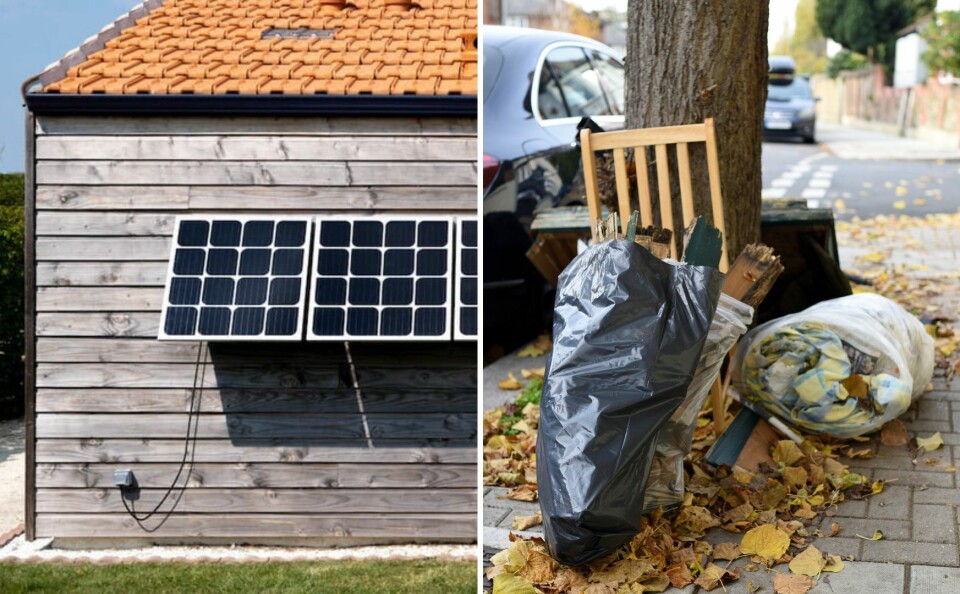-
‘It’s becoming intolerable’: homeowners in France move north to escape the heat
Heatwaves becoming more regular and intense
-
Homeowners in France warned of solar panel scam danger
Unscrupulous sellers target homeowners who are keen to install solar panels, says consumer rights group
-
More communes in France distribute Asian hornet traps
Residents are increasingly receiving help, with now the best time to capture the queens
Green news France: easy-install solar panels, stop fly-tipping team
Small plug-in solar panels could ‘democratise solar energy for all’, a new brigade in Colomiers challenges fly-tippers and more in our eco-news round-up

We take a look at the environmental issues currently in the French news.
Fines for energy-wasting shops
One of the problems for French shop owners during the July heatwave was how to keep their customers cool inside, while also enticing them into the premises with a friendly open-door policy.
However, local authorities in some towns and cities showed no mercy as they sought to reduce energy consumption during la canicule, bringing in decrees prohibiting shop keepers from leaving doors open while air conditioning units were working.
Read more: French shops to be required to keep doors closed while aircon is on
In Paris, for example, air conditioned businesses now have to keep their doors closed, with potential fines of up to €750, though initially authorities are simply seeking to inform shopkeepers of the rules.
The capital follows Bourg-en-Bresse (Ain), (Besançon (Doubs) and Lyon (Rhône) in implementing such a measure.
The rules do not concern restaurants or drinking establishments which have an outdoor terrace.
Agnès Pannier-Runacher, France’s Minister of Energy Transition, told Le Journal du Dimanche that leaving doors open while air conditioning is on means “20% more consumption and (...) it’s absurd.”
She also wants to enforce a stricter decree concerning “the prohibition of illuminated advertising regardless of the size of the city between 1am and 6am” (with the exception of airports and train stations).
Small solar panels for all
A Nantes start-up that aims to “democratise solar energy for all” by offering solar panels measure 2m2 that can put on the ground, in a garden, on a terrace or the wall of a house, already has 25 employees.
Beem, which was formed just two years ago, target customers are those with little space but who wish to adopt an eco-friendly approach to energy supply.
“It is a kit that we designed from scratch so that it can be installed by anyone in less than an hour without being a handyman,” said founder Ralph Feghali.
“By plugging the kit into an electrical outlet, we can directly inject power into the home network to supply equipment that consumes energy at that specific time.”
Each 2m2 Beem kit costs €780 (payable in 10 instalments) and the company produced 2,000 solar kits in 2021.
The panels are easy to use and can save up to 40% on energy bills according to the firm.
Read more: Solar panels on French property: how to make your own electricity
Fly-tipping brigade at work in Colomiers
An environmental “brigade” has been created in Colomiers, near Toulouse (Haute-Garonne) to fight against illegal dumping of waste such as boxes, furniture, household appliances and plastic items in the streets and parks.
14 team members travel around the town on electric bicycles to issue reminders to the those caught in the act of illegal dumping; they also have a newly created power to issue fines.
Another key aim is “to alert people to problematic situations (...) especially bulky items and general rubbish”, said mairie spokesman Christophe Corbi.
Read more: French mayor returns 12 bags of rubbish to fly-tipper
Lights out in Périgueux
At the end of July, authorities in Périgueux implemented a permanent policy to switch off street lights in residential neighbourhoods between midnight and 5:30am.
62 electrical substations will be switched off each night in a move that the council hopes will reduce its energy bill by 30% by next year.
The policy comes after a year-long experiment in the town’s Pierre de Coubertin and Moulin du Rousseau districts.
“The results were very positive, which is why we decided to extend the programme to the entire city,” mayor Delphine Labails told France Bleu.
Residents’ safety fears were rejected: “No insecurity has been noted in the experimental districts.
“The whole system has been seen and validated by the police,” added Mme Labails.
Related articles
Green news France: hikers survey Mont Blanc, less CO2 cruise ships
Pesticide no-spray zones in France ‘not enough to keep us safe’
Dogs trained to sniff out leaks in French drinking water pipe system
























